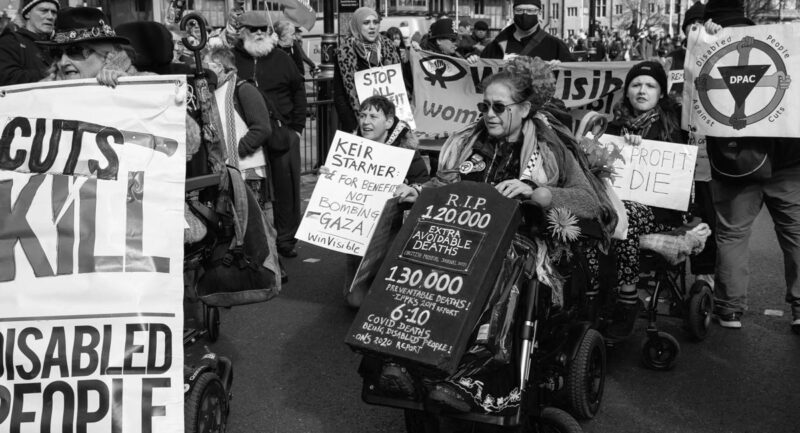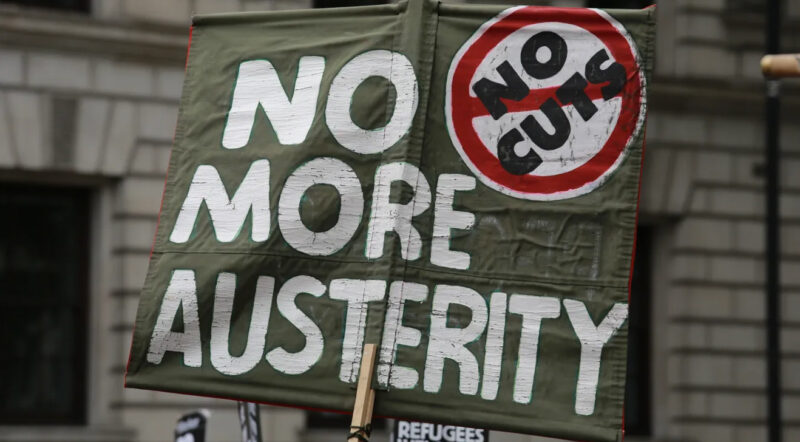Unite the Resistance: a missed opportunity
 Up to 1000 trade unionists gathered in London on Saturday to discuss the public sector pensions strike on 30 November. But despite hearing some inspiring speeches and gaining a sense of the momentum mounting in workplaces across the country, workers left without a plan to turn the day of action into a movement for a general strike. The blame for this, writes Jeremy Dewar, lies at the door of the organisers, the Socialist Workers Party.
Up to 1000 trade unionists gathered in London on Saturday to discuss the public sector pensions strike on 30 November. But despite hearing some inspiring speeches and gaining a sense of the momentum mounting in workplaces across the country, workers left without a plan to turn the day of action into a movement for a general strike. The blame for this, writes Jeremy Dewar, lies at the door of the organisers, the Socialist Workers Party.
[text of the resolution submitted by various trade unionists to the conference]
The day started promisingly. A speaker from Occupy LSX announced to everyone’s delight that the fledgling movement that has gripped the world’s imagination has made another step forward by occupying the UBS bank building in London. She promised to turn it into a “bank of ideas” and invited all trade unionists to come down and join in.
PCS general secretary Mark Serwotka also gave a thought-provoking speech. He pointed out that the latest turn of the crisis in Greece and Italy has led to a “world not run by governments but by bankers and financial markets”.
Serwotka rightly condemned the Labour Party’s Ed Balls, whose new five-point plan included cutting VAT on DIY products and building 10,000 council houses: “We need a million new council houses, not 10,000.”
He also attacked the TUC’s lack of initiative, saying that 30 November had to be the beginning, not the end of the movement and that “the PCS executive has unanimously agreed to call on the TUC to launch a public sector general strike in January” unless all the unions’ demands were met. Tellingly, however, the left leader did not say what the PCS would do if – or rather when – the TUC did not agree to this.
The other standout speaker of the morning was an electrician, who told us about the sparks’ campaign against a 35% pay cut on construction sites. They had launched a series of demos in London and then nationally, often smashing down fences, occupying sites and organising unofficial walkouts. A recent highpoint came on 9 November, when 2,000 workers converged in London to march alongside the students. The police, fearing a student-worker link-up, kettled the workers in Trafalgar Square for several hours, allegedly to “protect the students”!
The rank and file leader ended, pledging electricians would suspend their Wednesday demos in order to “stand shoulder to shoulder with public sector workers” but asked in return that on 7 December public service providers support 1,000 Balfour Beatty sparks, who will then be striking.
Resolution
But even by the end of the morning, the format of the convention was wearing thin. What was the point of the meeting? What could workers take home to strengthen their struggle against the government? And crucially, how were we going to stop the union officials from selling out the strike or shunting the movement into the cul-de-sac of sector-by-sector negotiations?
Unite the Resistance had stated from the outset on its website that the intention was not to set up another anticuts movement, which is good news – we don’t need yet another anticuts front campaign, we need to demand that Right to Work (the SWP), NSSN (SP) and Coalition of Resistance (increasingly led by Counterfire) call a conference with delegates from all local and national anti-cuts groups to establish a single anti-cuts coalition.
However the message coming from the SWP in local areas when asked was that UtR was a rank and file initiative, something that is urgently needed in the British trade union movement. The question of a rank and file movement is a separate, though linked, question to that of a united anticuts movement, which connects all those all in struggle against the ConDem cuts, not just trade unionists: non-unionised workers, the unemployed, pensioners, students, youth, council house tenants, the disabled. We need a movement inside the unions to struggle against the bureaucracy at their top that controls, limits and too often sells out actions. At a time when the whole welfare state is on the chopping block, a rank and file movement is not an optional extra but an essential component in a strategy to defeat the government. So the UtR conference was potentially a very good initiative if the plan was to launch such a movement along with a strategy to win. Unfortunately, it clearly wasn’t.
Workers Power had, along with Permanent Revolution and other trade union reps, produced a five-point resolution for the conference to do just that. Jerry Hicks, with 50,000 votes in Unite General Secretary election last year and leader of the Grassroots Left, endorsed the motion. Yet we were contacted on Friday by email by the SWP’s Martin Smith to tell us motions would not be allowed.
It argued that “maximum coordinated strike action – official if possible, unofficial if necessary – must be organised to throw back the Tory led offensive” and this needed to grow into a general strike.
We called for “cross-union strike committees… to organise effective coordinated action… with local anticuts committees” to “reject any attempts to break ranks by the union leaders/TUC on 30 November or after – no settlement until everyone settles”.
Crucially we called for an elected steering committee to organise regional conferences, “inviting the National Shop Stewards network and Coalition of Resistance to involve themselves in the organisation,” and “to take practical steps to build a cross-union rank and file movement to organise for the above actions, hold our leaders to account and transform the unions into fighting organisations”.
To that end, the motion would have committed UtR to a recall conference in February, with delegates from unions and workplaces and resolutions.
Evading the real problems
Despite having five hours for discussion, we were told that there was no time for resolutions. This bureaucratic excuse was nonsense.
For a start, the day disintegrated into an endless stream of speeches about getting everyone out on strike on 30 November and making picket lines, demos and rallies large. Sure, we are all doing these things in our workplaces, towns and cities, and some exchange of experience and ideas was useful – but for five hours?
The truth is, this was simply avoiding the most important question of the day: how do we build an alternative leadership to the TUC? Because if we do not answer this question, then the strike movement will be led to defeat.
We know that Dave Prentis, Gail Cartmail and Paul Kenny of Unison, Unite and the GMB respectively have no intention whatsoever of taking on the government. Like their predecessors in the 1980s, they will launch a few, disconnected “days of action” then tell the separate unions and sectors to settle on their own. They have already said that the follow-up will be negotiations on a sector-by-sector basis, with any future action being limited to and timed by the state of play in these secret talks.
This is what makes the SWP’s refusal to launch a struggle against the TUC and mainstream union leaders so criminal. For them, it is simply necessary to “raise the confidence” of workers and then they will spontaneously rise up and push these leaders to one side.
Unfortunately this is not the lesson from Greece or France, both of which have seen a series of huge one-day strikes against austerity. But each time the union bureaucrats have remained in control, limiting the action to a day or at most two, letting the most militant sectors – the Greek electricity or French oil refinery workers, for example – fight alone.
Each time, the union leaders have refused to place political demands on the government or the workers’ party leaders: for the nationalisation of the banks’ assets, to cut the hours, not the jobs, for an emergency plan of work on socially useful projects, etc. As a result, we now face a coup by technocrats (i.e. bankers) or right wing parties, as in Spain.
It is the pressing task of socialists today to get involved in the tremendous upsurge of militancy that is mounting in the run-up to 30 November, yes, but to give it a political direction. We need to encourage workers to use the strike as a stepping stone towards a general strike to bring down the government, to broaden their demands beyond fair pensions, and to prepare to act without the official union leaders when they hesitate, break ranks or sell out.
Missed opportunities
This was in reality therefore a missed opportunity. It was compounded by several other errors.
The organisers (the SWP) did attempt to sell to the delegates an Action Plan. Who drew it up and how was not made clear – certainly the unelected Steering Committee that was cobbled together after the last convention has never met. But it was useless: a series of Keynesian reforms, each supportable, but collectively inadequate to meet the scale of the crisis. The action plan mentioned no action, simply presenting a list of policies without a mention of how to achieve them, such as the general strike or organising local action committees.
If the SWP could put this together for the delegates’ approval, why could they not also manage to produce a real plan of action to take the movement forward? Why could they not open up the same opportunity to others, in the form of taking resolutions?
Worst of all, SWP members prevented a lunchtime rank and file healthworkers’ caucus from calling a national conference. The fringe meeting was called by a Workers Power nurse and about 30 NHS militants attended.
When we put it to the meeting that we convene an emergency national conference open to all NHS trade unionists, to decide how to take the struggle forward in the midst of outrageous sabotage from Unison officials, three-quarters of the meeting signalled their approval. Astonishingly, the SWP then announced that this was not a big enough vote and the suggestion would be passed on to Healthworker Network meeting in December, which is largely run by the SWP. It stifled the initiative of the meeting, and crucially it misses the opportunity to advertise such an initiative to the tens of thousands of healthworkers on strike on N30.
Here is a worked example of what is wrong with the SWP’s approach. They are incapable of developing a rank and file initiative against the union bureaucracy – unless it is tied to their own politics and organisation, and under their own control from the outset. In normal times, this is a dead-end. Today, when we face a historic crisis of the whole capitalist system, which can only be solved by the making the workers or the bosses pay, it is criminal.






